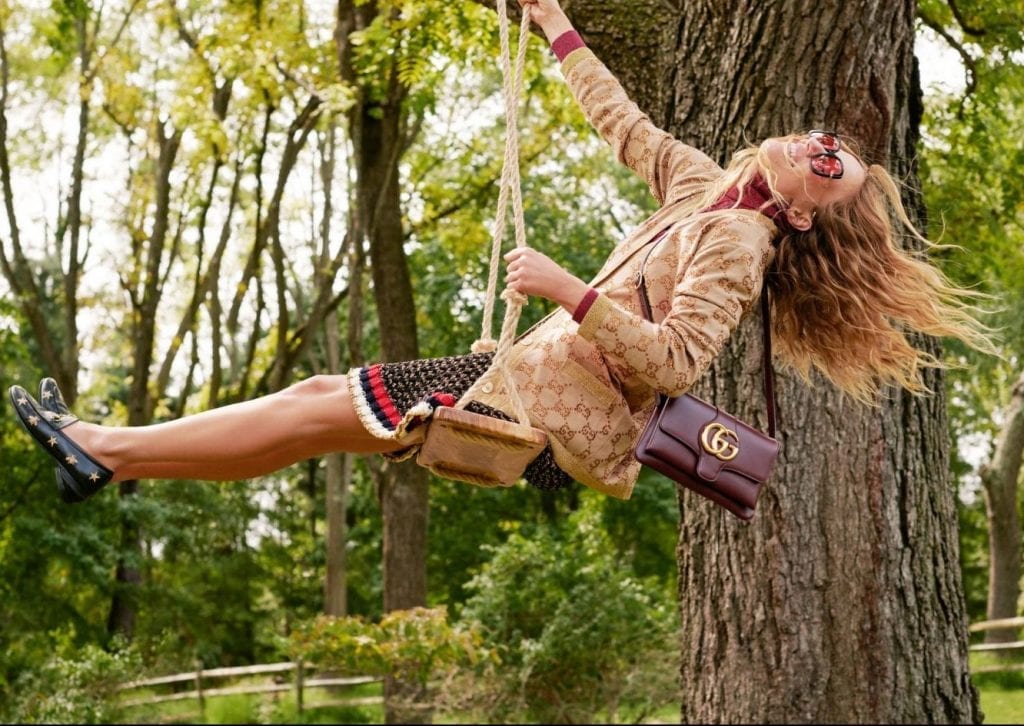The RealReal announced on Monday that it is partnering with Gucci for a months-long tie-up to promote circularity in the luxury fashion space. According to a release, the San Francisco-based resale site The RealReal is teaming up with Gucci through the end of the year to launch an online shop featuring pre-owned Gucci items, sourced directly from Gucci, as well as from its own consignors. Not only is Gucci one of the most sought-after brands on The RealReal’s sweeping site, it is its biggest luxury partner to date.
“The inherent longevity of luxury products support a circular economy and, by joining forces with The RealReal, Gucci is promoting this avenue to extend the life of its products even further,” The RealReal said in a statement on Monday, noting that the Italian fashion brand “is one of The RealReal’s most in-demand luxury brands year after year.” Gucci continues to see strong growth in resale demand (up another 19 percent this year), and “commands strong resale value for consignors, with clothing resale value 2.3x stronger than average compared to all brands sold on The RealReal.”
“Gucci is raising the bar not only for the fashion industry, but for all companies by continuously innovating to make its business more sustainable,” said Julie Wainwright, founder and CEO of The RealReal. “Together we’re shining a global spotlight on resale that we hope will encourage all consumers to support the circular economy and join us in reducing fashion’s carbon footprint.”
In addition to being the biggest company to date to stamp its name on a resale partnership, Gucci’s new tie-up with The RealReal is striking given that while resale is a burgeoning new economy (the $28 billion resale market is expected to grow to $51 billion by 2023), luxury brands have largely tended to shy away from it in an effort to protect brand goodwill and maintain the image of – and price associated with – exclusivity. Paris-based luxury goods brand Chanel, for instance, has gone so far as to file lawsuits against resale sites, including The RealReal, in connection with such resale practices (and allegations of trademark infringement and counterfeiting), highlighting the rocky relationship between brands and resale entities, with such tension created, at least in part, by the fact that digitally-native resale companies and third-party marketplaces have substantially eroded the ability of brands to exclusively control the distribution of their products.
While the eruption of the resale market has forced some companies into court, others have opted to embrace the push for circulatory. Stella McCartney, for instance, made headlines when it teamed up with The RealReal in early 2018 in what has been called an “unprecedented call-to-action in bringing awareness to the circular economy.” Since then, handbag company Mark Cross announced last year that it would launch its own secondhand online platform in an effort to cater to the demands of consumers (namely, millennials and Gen-Z), while also controlling and protecting its supply and brand image. Still yet, Levi’s announced this week that it will debut a resale initiative of its own called Levi’s SecondHand, which will not only see it buy back jeans but enable consumers to buy pre-owned products directly from its stores and e-commerce site.
Now Gucci – whose parent company Kering has been among those at the forefront of applying sustainability-centric initiatives to the luxury model, from the adoption of greener materials to a potential movement away from season-centric offerings (in some cases) – will try its hand at formally feeding the resale market, maybe in an attempt to gauge demand and success ahead of launching its own endeavor. (An in-house buy-back and resell operation would enable Kering-owned brands to better control the resale market of their products, including issues of authentication (which has been a point of contention for resellers, including The RealReal) and alteration, the latter of which has been at the center of Chanel’s fight against luxury consignment company What Goes Around Comes Around as of late).
According to The RealReal, which currently boasts more than 17 million users, Gucci is the first brand it has seen encouraging its community not only to consign, but to shop resale – “a big endorsement for the power of resale to make fashion more sustainable.” Wainwright says that “by encouraging their community to shop resale, Gucci will help us bring more people into the circular economy and show that resale is complementary to brands.”













